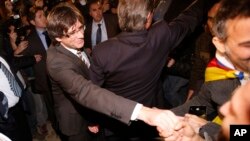Lawmakers in Spain’s pro-independence Catalonia region ended months of political gridlock Sunday, swearing in a new separatist leader who promised secession within 18 months.
Carles Puigdemont was confirmed late Sunday by a vote of 70-63, one day after his predecessor, Artur Mas, scrapped his plan to regain the presidency after another regional faction refused to support him.
Shortly after Sunday’s vote, Spanish Prime Minister Mariano Rajoy repeated long-standing promises to block secession, which the Spanish Supreme court earlier found to be unconstitutional.
“I want to remind all members of the Catalan parliament that the state always works, and that democracy is equally strong, always, whether there is an acting government or not. But I will not hesitate to be firm or lack determination,” to defend what he described as Spanish unity and sovereignty.
The national government has blocked a series of earlier Catalan independence initiatives, while the European Union has warned that secession could result in ejection from the 28-nation trade and political alliance.
For their part, Catalonian independence parties have been unable to agree since elections in September on who should lead the new regional government. That discord peaked Saturday when Artur Mas withdrew his candidacy, clearing the way for Puigdemont to claim the leadership.
The highly industrialized, heavily populated Catalonia region in Spain’s northeast is one of the country’s wealthiest regions.
Secession sentiment spread in recent years as economic recession spread through Europe, stalling the national economy.
Polling in 2014 showed 80 percent of the region’s 7.5 million residents wanted more autonomy from the Madrid government, with about 50 percent of those favoring total independence.









